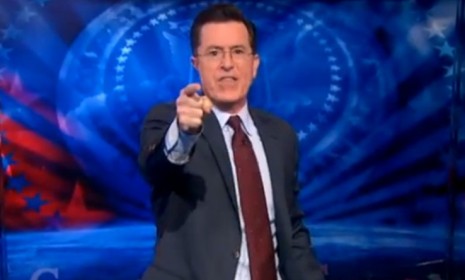Stephen Colbert's 'not-so-funny' presidential announcement
Announcing a 2012 run, Colbert hands his super PAC to Jon Stewart — spotlighting the too-close-for-comfort relationships of some candidates and PACs

A free daily email with the biggest news stories of the day – and the best features from TheWeek.com
You are now subscribed
Your newsletter sign-up was successful
The video: Stephen Colbert isn't on the ballot in South Carolina. But a PPP survey this week put his support in the Palmetto State's Jan. 21 presidential primary at 5 percent — better than actual candidate Jon Huntsman. So on Thursday night's show, Colbert asked his lawyer, Trevor Potter, if he could run for president and continue leading his successful super PAC, Citizens for Better Tomorrow Tomorrow. No, Potter said: Campaign law prohibits candidates from coordinating with super PACs. That inspired Colbert to hand over his super PAC to close friend and business partner Jon Stewart. Perfectly legal, Potter pronounced. Assured of a sympathetic super PAC, Colbert then announced that he was "forming an exploratory committee to lay the groundwork for [his] possible candidacy for the president of the United States of South Carolina." Cue celebratory balloon drop!
The reaction: This could "be more fun, and pointed, than just another vanity run," says James Poniewozik at TIME. Colbert is effectively and informatively satirizing the absurdity of campaign rules that allow super PACs to accept unlimited contributions, which they use to prop up candidates. But that's actually "not so funny," says Peter Grier at The Christian Science Monitor, given that Mitt Romney and Co. are as cozy with their super PACS as Colbert is with Stewart. See for yourself:
The Week
Escape your echo chamber. Get the facts behind the news, plus analysis from multiple perspectives.

Sign up for The Week's Free Newsletters
From our morning news briefing to a weekly Good News Newsletter, get the best of The Week delivered directly to your inbox.
From our morning news briefing to a weekly Good News Newsletter, get the best of The Week delivered directly to your inbox.
Get More: Colbert Report Full Episodes,Political Humor & Satire Blog,Video Archive
A free daily email with the biggest news stories of the day – and the best features from TheWeek.com
-
 Bad Bunny’s Super Bowl: A win for unity
Bad Bunny’s Super Bowl: A win for unityFeature The global superstar's halftime show was a celebration for everyone to enjoy
-
 Book reviews: ‘Bonfire of the Murdochs’ and ‘The Typewriter and the Guillotine’
Book reviews: ‘Bonfire of the Murdochs’ and ‘The Typewriter and the Guillotine’Feature New insights into the Murdoch family’s turmoil and a renowned journalist’s time in pre-World War II Paris
-
 Witkoff and Kushner tackle Ukraine, Iran in Geneva
Witkoff and Kushner tackle Ukraine, Iran in GenevaSpeed Read Steve Witkoff and Jared Kushner held negotiations aimed at securing a nuclear deal with Iran and an end to Russia’s war in Ukraine
-
 The billionaires’ wealth tax: a catastrophe for California?
The billionaires’ wealth tax: a catastrophe for California?Talking Point Peter Thiel and Larry Page preparing to change state residency
-
 Bari Weiss’ ‘60 Minutes’ scandal is about more than one report
Bari Weiss’ ‘60 Minutes’ scandal is about more than one reportIN THE SPOTLIGHT By blocking an approved segment on a controversial prison holding US deportees in El Salvador, the editor-in-chief of CBS News has become the main story
-
 Has Zohran Mamdani shown the Democrats how to win again?
Has Zohran Mamdani shown the Democrats how to win again?Today’s Big Question New York City mayoral election touted as victory for left-wing populists but moderate centrist wins elsewhere present more complex path for Democratic Party
-
 Millions turn out for anti-Trump ‘No Kings’ rallies
Millions turn out for anti-Trump ‘No Kings’ ralliesSpeed Read An estimated 7 million people participated, 2 million more than at the first ‘No Kings’ protest in June
-
 Ghislaine Maxwell: angling for a Trump pardon
Ghislaine Maxwell: angling for a Trump pardonTalking Point Convicted sex trafficker's testimony could shed new light on president's links to Jeffrey Epstein
-
 The last words and final moments of 40 presidents
The last words and final moments of 40 presidentsThe Explainer Some are eloquent quotes worthy of the holders of the highest office in the nation, and others... aren't
-
 The JFK files: the truth at last?
The JFK files: the truth at last?In The Spotlight More than 64,000 previously classified documents relating the 1963 assassination of John F. Kennedy have been released by the Trump administration
-
 'Seriously, not literally': how should the world take Donald Trump?
'Seriously, not literally': how should the world take Donald Trump?Today's big question White House rhetoric and reality look likely to become increasingly blurred